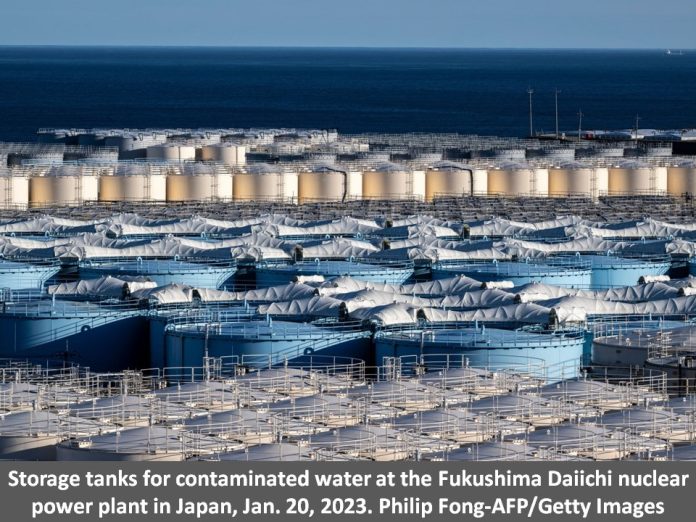An international law expert believes Japan is passing the risk of its upcoming release of treated nuclear wastewater into the ocean onto Pacific leaders.
It follows a meeting in Japan where Prime Minister Fumio Kishida gave his assurance to the Pacific Islands Forum (PIF) that Japan will not discharge over one million tonnes of wastewater from the damaged Fukushima Daiichi Nuclear Power Plant until it is verifiably safe to do so.
A PIF spokesperson said the delegation in Tokyo welcomed Kishida’s assurance, which was based on a relationship built of trust and in the spirit of friendship.
But lawyer Duncan Currie said it was a “lacklustre” outcome with Pacific nations stuck between a rock and a hard place.
He believes the outcome was a “bit vague” and seems like Japan is passing the risk onto Pacific leaders.
“It’s very soft and it is not going to be effective because Japan is going to continue to say it is safe even in the face of evidence that it’s not.
“We do know the ALPS system has failed in the past, there are so many unknowns,” Currie said.
“We believe that water to be discharged into the sea this time will satisfy national regulatory standards as well as it will be in compliance with international standards as well,” TEPCO Chief Officer for ALPS treated water management Junichi Matsumoto said.
In an exclusive interview with TEPCO last month Matsumoto said the further the substances travel, the smaller the concentration will be.
“Therefore, we don’t think that that would cause damage by pollution or contamination when they disperse into a wider area,” he said.
However, a Japanese seaweed farmer believes there is no way an upcoming release of over a million tonnes of treated Fukushima nuclear wastewater into the Pacific Ocean will be safe despite Tokyo Electric Power Companies assurances.
Futoshi Aizawa and colonialism researcher/translator Miku Narisawa talked about their experience in speaking out about their concerns at an international conference held in Dunedin, New Zealand late last year.
Aizawa and Narisawa live just two hours from the release site in Japan and said they feel silenced.
They want more transparency by the government of Japan and call on nations surrounded by the Pacific Ocean to stand together.
Currie believes there is a solid argument against Japan.
“Laws are there to be enforced, we shouldn’t just bow down.
“Quite frankly this almost comes down to an open and shut case, I don’t say that lightly.
“The international laws are clear that states can not undertake activities in their own waters that will have harmful effects in the high seas and the only question there is, is how harmful it will be. There is no question that releasing radioactivity is contaminating the high seas,” Currie said.
Even if it was safe he said there is another issue: reputational risk.
“If consumers start to get the impression that Pacific tuna is maybe contaminated then that would have its own economic risk so there are no easy solutions here,” the lawyer said.
Duncan Currie has been working with groups in South Korea for around a year on the issue.
“It really is becoming increasingly apparent that the only way of stopping Japan is by taking legal action.”
He said the way to do it is filing a case before the International Tribunal for the Law of the Sea on the basis that Japan is not legally permitted to cause this pollution of the high seas.
“While it is good news the Pacific Islands Forum is taking this seriously, there is no indication Japan will change its mind,” he said.
Last week the President of the Federated States of Micronesia (FSM) came out in support of Japan and said he does not have concerns about the issue anymore. His comments came after an announcement of more aid to FSM by Japan.
A high level PIF delegation has this week travelled to Japan to meet with the government in an effort to get them to agree to press pause on plans until their independent experts are satisfied that the release is scientifically proven to be safe.
In a roundabout way Japan agreed but Currie said the outcome was not good enough.
“The politics are really difficult because you’ve effectively got China and South Korea on the one side and Japan and the United States on the other: which is not good geopolitics.
“The U.S does strongly support Japan in any case and they obviously support them against China and then at the same time the Pacific Island countries are enormously reliant on Japan for so many reasons, aid, fisheries assistance, fisheries contracts and so on that they are in between a rock and a hard place and that is what is so difficult about it.
In the same trip the incoming Forum chair Mark Brown congratulated the Government of Japan on its planned announcement of support for the Pacific Islands Forum Leaders’ Declaration on Preserving Maritime Zones in the face of Climate Change-related Sea-level rise.
A statement from the office of the Forum stated both Leaders looked forward to the PALM 10 meeting in 2024, and to further discussing issues of mutual interests.
Currie said sadly only time will tell if the release is safe.
Japan maintains that it will be safe.
SOURCE: RNZ PACIFIC/PACNEWS













